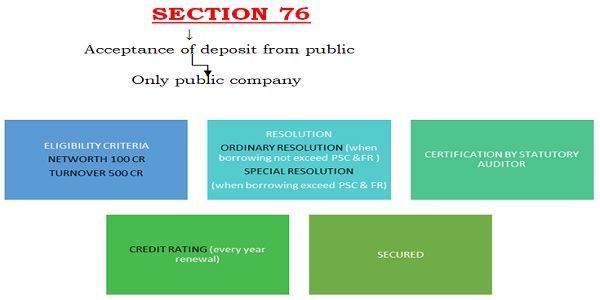Deposits under Section 73 to 76A of Companies Act, 2013
(READ WITH DEPOSITS RULES 2014.)
SECTION 73 TO 76A
> Applicable to public as well as Private Company
> Private- take deposit from member only
Public- take deposit from member and public
1. Recurring deposits- Periodic interval
2. DD – Saving A/C when demand arises
3. FD – Fixed deposit
> When person pay deposit then company gives
↓
Deposit receipts
↓
Promissory notes
> Eligible Public company
Net worth ≥ 100 crore
Turnover ≥ 500 crore
(If this condition fulfill then only take money from public if not then only from members)
> Company interest is always more than bank rate (Maximum- 12.5%)
> If company need deposit then company need to provide circular/advertisement in Form – DPT-1
> Why not consider as prospectus – Because DR is not considered as securities
> Deposit
1. Public – shall be secure
2. Member – may be secure
Security – principle + interest= security value
> Definition of deposit 2(31)
It includes any receipt of money by way of deposit or loan or any other form by a company but does not include such categories as prescribed by Central government and consultation by RBI.
> Deposit not applicable to
Banking company
NBFC
Housing finance company
> COMPANY
MEMBERS- section 73 →pass OR + SECTION 73(2) (a,b,c,e,f)
PUBLIC – section 76→ pass SR IF condition satisfy THEN pass OR + section 73(2)(a,b,c,e) +credit rating
(CREDIT RATING – AAA , AA , A , BBB ,BB, B, C, D)
> Section 73(2)
a) DPT-1 –circular
b) DPT-2 – file to ROC atleast before 30 days before circulation
c) Debenture repayment redemption a/c →liquidity clause
EXAMPLE 1 April 2020 to 31 march 2021 → 30 days→ 30 april 2020
↓
20% amount reserve
↓
Of the deposit maturing following year
For next year 2021-2022
d. Deposit insurance- OMITTED
e) NO default by company in past (subsisting default →so 5 years has been passed on which such default has been made good)
f) Secured or unsecured
↓
(If partially secured- then treats as unsecured)
> Section 73(2)(a to e)
(Exempt to private company if accept from member not exceeding 100% of PSC+ FR)
> SECTION 73
Acceptance of deposit from members
↙↘
↙ ↘
↙ ↘
Both private & Public rectification by company regarding past default

> Copy of resolution to ROC before inviting public
> Deposit trustee
-banking company
-PFI
-Insurance company
– Body corporate more than 10 crore
> Section 76
OR/SR (Deposit from public)→section 180(1)(c) →borrowing by companies
1. Ordinary resolution in case
Existing borrowing + new borrowing ≤ paid up share capital +free reserve +securities premium
2. Special resolution in case
Existing borrowing + new borrowing ≥ paid up share capital + free reserve + securities premium
> Rule 3 Terms and conditions of acceptance of deposit by company
1. eligible company
–Non government eligible company
Member – Max.10% of paid up share capital +free reserve + securities premium
Other person – max.25% of paid up share capital +free reserve + securities premium
–Government eligible company
Upto 35% of paid up share capital +free reserve + securities premium
2. Other than eligible company
– private company-100%
– or not fulfill certain criteria
- Max 35% of paid up share capital +free reserve + securities premium only from member.
- Other then eligible company
IFSC Public Company or Other Private Company
Maximum 100% PSC and FR and SP from its members and shall file DPT-3 to ROC
FOLLOWING PRIVATE COMPANY MAY ACCEPT DEPOSIT WITHOUT ANY LIMIT
1. START UP COMPANY FOR 5 YEARS
2. OTHER PRIVATE COMPANY IF
A. NEITHER SUBSIDAIRY NOR ASSOCIATE IF ANY COMPANY
B. BORROWING NOT MORE THEN TWICE OF PSC OR RS 50 CR
(WHICHEVER IS LESS)
C. NO DEFAULT IN REPAYMENT OF DEPOSIT
- PERIOD OF ACCEPTANCE
Minimum 6 months
Maximum 6 months
(less then 6 month allow if deposit accept not more then 10 % of PSC+FR+S.P)
but not less then 3 months
- CEELING ON BROKERAGE
Maximum prescribed by RBI 12.5%
- REGULATED BY
MCA
RBI
SEBI
- JOINT DEPOSITOR
If in physical form then maximum 4
If in E form then maximum 3
But in case of deposits maximum 3 allowed
RULE 6 – CREATION OF SECURITIES
With In 30 Days From Date Of Acceptance
Value Of Security > Value Of Deposits
RULE 16 – RETURN OF DEPOSIT TO FILED WITH REGISTRAR
Every Company shall file return of Deposit in DPT-3 on or before 30 June
This return shall contain information as on 31st March and shall certified by Auditor
It is further clarified that DPT -3 shall be used filling return of deposit not considerd as Deposit by every Company other then Government Company.
RULE – 7 APPOINTMENT OF TRUSTEE BY DEPOSITORS
Execute Deposit Trust Deed in DPT -2 at least 7 days before issuing dpt-1
Because DPT -1 includes name of deposit trustee
RULE -14 REGISTRAR OF DEPOSIT
KEEP at R.0 for atleast 8 years (calender)
RULE -17 PENAL RATE OF INTEREST
18% P.A for overdue period
SECTION 74
TRANSITIONAL PERIOD
DPT-4 filed to ROC with in 3 years if deposits taken by the company w.e.f 1st april 2014
SECTION -75 DAMAGES FOR FRAUD
LIABLE UNDER SECTION 447
SECTION 76A PENALTY
Addition to repay and interest theron
Maximum –10 cr
Minimum ( 1cr or twice the amount of deposit) whichever is lower
Officer In default
Maximum 2cr & Minimum 25 lakh and upto 7 years
Definition of Deposit:
Deposit has been defined under Section 2(31) of the Companies Act, 2013 further expanded under the Deposit Rules, 2014.
As per Section 2(31), “deposit” includes any receipt of money by way of deposit or loan or in any other form by a company, but does not include such categories of amount as may be prescribed in consultation with the Reserve Bank of India.
Accordingly, Rule 2(1)(c) of Companies (Acceptance of Deposit) Rules, 2014, excludes the following amount received by a Company from the ambit of Deposit and shall not be considered as deposits –
i. any amount received from the Central Government or a State Government or local authority or statutory authority, or any amount Whose repayment is guaranteed by the Central Government or a State Government;
ii. any amount received from foreign Governments, foreign or international banks, foreign bodies corporate and foreign citizens, foreign authorities or persons resident outside India;
iii.Loans or facility from banks;
iv. Loans from Public Financial Institutions/ Insurance Companies;
v. any amount received against issue of commercial paper or any other instruments;
vi. any amount received by a company from any other company;
vii. Any amount received through Public offer. However, if securities not allotted within 60 days and refund not made within 15 days then such amount will be treated as Deposit;
viii. Any amount received from the director of the company and in case of private company also from the relative of the director of the company subject to the condition that the amount has been given from own’s fund and not from borrowings.
ix. Any amount raised by the issue of bonds or debentures secured by a first charge or a charge ranking pari passu with the first charge, compulsorily convertible within 10 years;
x. Any amount raised by issue of Unsecured Non-convertible debentures;
xi. Non-interest-bearing security deposit from employee of the company under the contract of employment to the extent not exceeding his annual salary;
xii. Any non-interest bearing amount received and held in trust;
xiii. Any amount received in the course of business –
(a) As advance for supply of good or services provided that such goods or services are supplied within 365 days of the receipt of advance;
(b) As advance in connection with consideration for an immovable property provided such advance is adjusted against such property in accordance with the terms of the agreement;
(c) As security deposit for the performance of the contract;
(d) As advance under long term projects for supply of capital goods;
Provided that if the amount received under (a), (b) & (d) becomes refundable due to lack of necessary permission or approval to deal in the concerned goods or services, then the amount received shall be deemed as deposit on the expiry of 15 days from the date they become due for refund.
(e) As advance towards consideration for future warranty or maintenance contract;
(f) As advance received which is allowed by any sectoral regulator;
(g) As advance for subscription towards publication;
xiv. Any amount of unsecured loan brought in by the promoters subject to the fulfilment of the following conditions:
(a) the loan is brought in pursuance of the stipulation imposed by the lending institutions on the promoters to contribute such finance;
(b) the loan is provided by the promoters themselves or by their relatives or by both; and
(c) the exemption under this sub-clause shall be available only till the loans of financial institution or bank are repaid and not thereafter;
xv. Any amount accepted by a Nidhi Company;
xvi. Any amount received by way of subscription in respect of a chit under the Chit Fund Act, 1982;
xvii. Any amount received by the company under any collective investment scheme;
xviii. An amount of 25 lakh rupees or more received by a start-up company, by way of a convertible note (convertible into equity shares or repayable within a period not exceeding five years from the date of issue) in a single tranche, from a person;
xix. Any amount received by a company from registered Alternate Investment Funds, Domestic Venture Capital Funds, Infrastructure Investment Trusts and Mutual Funds.





